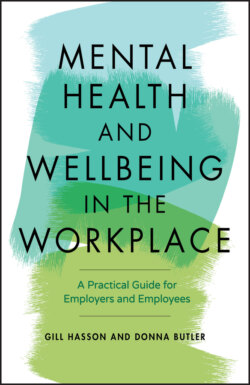Читать книгу Mental Health and Wellbeing in the Workplace - Gill Hasson - Страница 14
Who Experiences Mental Ill-health and What Are the Causes?
Оглавление‘One in four’ is widely cited as the number of people who suffer from a mental health problem. The Health Survey for England found in 2014 that one in four people reported having been diagnosed with at least one mental illness at some point in their lives. A further 18% said they'd experienced an illness but hadn't been diagnosed.
As with so much of what it means to be human, our levels of mental health and wellbeing are a result of both genetic (nature) and environmental factors (nurture).
Although no specific genes for depression have been identified, research has shown that if you have a close family member with depression, you are more likely to experience depression yourself. While this might be caused by our biology, (nature) this link could also be because we usually learn behaviour and ways of coping from the people around us as we grow up. (Nurture)
Mind
Many factors can contribute to the onset of a mental illness. These include prenatal stress, adverse childhood experiences (ACE), including childhood neglect, abuse, and trauma; stress; bereavement; relationship breakdown; physical and sexual abuse; experiencing stigma or discrimination; unemployment; social isolation and loneliness; poverty, debt, homelessness or poor housing; physical illness or disability.
Mental ill-health can affect anyone, regardless of gender, age, race, ethnicity, religion, geography, sexual orientation, or other aspects of cultural background or identity. But some people are more vulnerable than others.
For example, 7.7 million adults aged 55+ say they have experienced depression and 7.3 million have suffered with anxiety, according to 2017 YouGov research for the charity Age UK. For people over 55, the death of loved ones, their own ill-health, and financial worries are the most common triggers for mental health problems.
In their 2016 report Mental Health Problems in People with Learning Disabilities, The National Institute for Health and Care Excellence (NICE) state that mental health problems in people with learning disabilities are more common than in the general population, with a point prevalence of about 30%.
People from a Black, Asian, and minority ethnic (BAME) background are, according to the UK Mental Health Foundation, generally at higher risk of mental ill-health. They also report that Post Traumatic Stress Disorder (PTSD) is more common in women of black ethnic origin.
The Mental Health Foundation report that evidence suggests people identifying as LGBT are at higher risk of experiencing poor mental health such as depression, suicidal thoughts, self-harm, and alcohol and substance misuse – compared to heterosexual people, due to a range of factors, including discrimination, isolation, and homophobia.
Whoever we are, whatever our circumstances, and whatever the statistics, what's most important is to recognize that we all have mental health. The spectrum ranges from a positive, healthy state to a poor or extremely poor state of mental health with severe symptoms or conditions. It's also important to know that our mental health can fluctuate, depending on life situations, and on how we manage our mental health.
